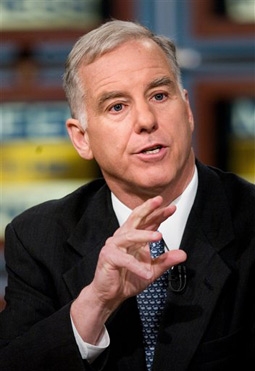
Howard Dean has a message to convey. He is on a mission to clarify the fine points of President Barack Obama’s plan for American healthcare reform, and to convince the public of its dire importance (though he asserts he is preaching to the choir in most cases). The tone in Howard Dean’s voice throughout our interview was serious and succinct as if to say, “We are passed the point of pleasantries and entertaining sound bites. Our healthcare crisis is dangerous, and change must be imminent.” Point taken.
Not surprisingly, our conversation shone a harsh spotlight on the distressing fact that we are moving further and further in the direction of partisan politics, with both parties resorting to schoolyard tactics at times. The American healthcare debate, both in the House and in the Senate, resembles an old fashioned Mexican standoff with Democrats holding firm to their own ideology every bit as much as Republicans. But as Howard Dean points out the Democrats are arguing the healthcare debate while Republicans are fighting for the fall of the Democratic Party. As Rush Limbaugh and Sarah Palin continue to rally their foot soldiers on the right, people on the left are scratching their heads wondering who in their right mind would not want every American man, woman and child to be entitled to adequate healthcare. Many Conservatives would have the public believe that having a social conscience makes one a Socialist, while Howard Dean points out that it simply makes you a human being, and that healthy Capitalism is indeed Capitalism with a conscience.
A six term Governor for the state of Vermont, Howard Dean spent the better part of the past five years cementing his status as a leader within the Democratic Party, upholding its values, producing key strategy and serving as Democratic National Committee Chairman from his appointment in 2005 until this year when he stepped down to focus on independent political consulting. He continues his campaign for healthcare reform among other timely issues he is passionate about including: childhood development, alternative forms of energy and expansion of grassroots politics.
In 2008 then Presidential candidate Barack Obama turned to Howard Dean as a strategic and moral compass, going on to implement Dean’s grassroots approach to politics along with his successful “50 State Strategy,” born out of Dean’s work with the DNC where he now holds the honorary position of Chairman Emeritus.
In unison with Howard Dean’s demeanor I knew there was little time for idol chatter and our back and forth dialogue focused mainly on the facts at hand so that we may continue to shed factual light on so many dim misconceptions surrounding healthcare reform.
PR.com (Allison Kugel): What do you make of some of America’s working class crying “Socialism” and protesting that they “want their old America back” in response to President Obama’s proposed healthcare reform?
Howard Dean: I don’t really think it’s in response to that. I think it’s in response to the anger machine that’s become the Republican Party over the last thirty years. This is a group of folks whose base has gotten smaller and smaller, and as they get smaller, they get angrier and angrier.
PR.com: You think that’s the main source of their anger, that fact that the [Republican] Party has lost some clout?
Howard Dean: It’s not so much their party. This election in 2008 was a generational change for America. It’s the first time that more people under thirty-five voted than people over sixty-five. They’re angry about the change. They don’t know what to do about it. They’re hit hard by the recession, and they’re told a lot of things that aren’t so by Rush Limbaugh.
PR.com: The reason I asked you that question first is because it’s so perplexing that the people who you see out there spreading the hate message for the Republican Party and saying they don’t believe in what President Obama is trying to do for healthcare reform, they seem to be the people who could benefit from it the most. Many of these people don’t have a lot of financial resources at their disposal. That’s the dichotomy that confuses the hell out of me.
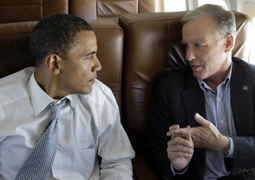
Howard Dean: That’s often the case, though. And I think the great thing about the Obama healthcare plan is that it lets people choose for themselves. The truth is this is a group of people who can be virulently against government run anything and still be on Medicare (laughs). They’re not cognizant of the facts because they’ve been told a lot of things that aren’t so. That’s what you’re seeing at those [town hall] meetings. But eventually they will benefit from the changes that are made.
PR.com: Do you think they will eventually concede to the fact that they are benefiting?
Howard Dean: They’ll never concede, but they’ll sign up.
PR.com: Can you demystify the operational functions of the Medicare system for people? Then maybe people can get a clearer picture of how publicly run healthcare works.
Howard Dean: It actually works pretty well. When you turn sixty-five you sign up for an insurance program that you’ve paid for, for most of your life. You pay some premiums every month and you get a pretty comprehensive healthcare bill, and the hospitals and so forth pretty much take care of the billing. You get a lot of paperwork, but mostly the bills are paid.
PR.com: Do you get caught up in a lot of bureaucracy and red tape with Medicare, or is it a fairly simple process?
Howard Dean: There’s plenty of bureaucracy and red tape, but it’s not nearly as much as the private insurance sector.
PR.com: I think a lot of people are equating the notion of “public” as it pertains to healthcare as second rate, almost like comparing generic drugs with the brand name. Is that an accurate sentiment, or not?
Howard Dean: I don’t really think people are making that equation. I think if you really look at what’s happening, there was a recent polling two days ago that the New York Times polled. It shows that 65% of the American people wanted a public option. People like the Veteran’s Administration care. People like Medicare. Lord knows Congress likes their own healthcare plan. So I don’t think the public option has a bad name. I think, actually, if two thirds of the American people want it, it’s probably time to make it available to people.
PR.com: Do you think that 65% of the American population would actually sign up for the public healthcare option?
Howard Dean: No, I don’t think they’d sign up, but I think they believe that they ought to have a choice.
PR.com: It’s an interesting irony that obviously members of Congress are employees of the Unites States Government, so that’s who’s providing their health insurance for them.
Howard Dean: That’s true, and not only that, they actually have government run healthcare in the Capital. If you pay four hundred dollars a year you can go see the doctor pretty much anytime you want. And if you get sick you can go to Walter Reed Hospital (Walter Reed Army Medical Center in Washington DC); it’s a government run hospital. So Congress, in fact, has what the Republican Congressmen are complaining about. And I’ve long thought that we ought to have exactly what they have.
PR.com: Do they understand the hypocrisy?
Howard Dean: Oh, of course they understand the hypocrisy. That’s what people do in Congress. But the fact is that the American people get it. They understand that they ought to have what Congress has.
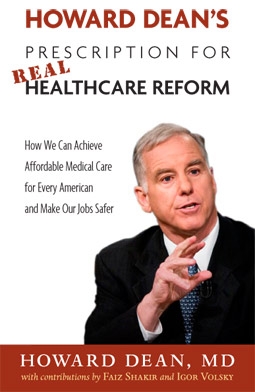
PR.com: In your book (Howard Dean’s Prescription For Real Healthcare Reform) you stated that members of the Republican Party consulted with Frank Luntz (a Republican pollster and political consultant), and that Luntz issued a memo in which, as you stated, “he instructs Republicans to ‘be vocally and passionately on the side of reform’ but then urges GOP lawmakers to misrepresent and obstruct any real chance of passing comprehensive legislation.”
Howard Dean: That’s exactly what they’re doing, but they haven’t fooled the American people. If you look at the numbers, they’re just extraordinary, something like 82% think that President Obama [should reform] healthcare. It’s down in the 20s for Republicans. The American people are not stupid. You can lie to them, and after awhile they get it, and that’s exactly what’s happened here.
PR.com: Are the Republicans actually conspiring to intentionally mislead the public?
Howard Dean: Yes, they are. Frank Luntz does that. That’s called spin-doctoring. That’s where the “death panels” came from, and all these other kinds of things that are just total fabrications.
PR.com: Why are Republicans so good at coming up with buzzwords like “death panel” or “rationed healthcare,” or “Socialized medicine?” Why are they so effective at getting their message out there? And why are Democrats so ineffective at getting their message out?
Howard Dean: I don’t know that the Republicans are so effective. They’ve been doing this for a long time and the numbers for the Republican Party are atrocious. It’s maddening to people to see these lies out there all the time, but the fact is the American people are not buying it. The Socialized medicine thing didn’t work. You rarely hear that anymore. Government takeover of healthcare? What they do is they poll for all these things and find out what’s the most offensive to most people, and use it. But they’ve actually struck out, which is why their rhetoric is getting more and more crazy.
PR.com: So what we’re actually seeing is a very small percentage of the American people who are up in arms. In other words, it makes the news but it’s a small percentage of people.
Howard Dean: You’re seeing the hardcore right wing base, and they’re getting smaller and smaller. Now that doesn’t mean that all these people coming to town meetings are hardcore right wingers. I’ve had a number of public meetings where Conservatives ask smart questions. But the Republicans have chosen to absent themselves from this debate for political reasons.
PR.com: Who is a Conservative in Congress who actually makes sense and is able to be reasoned with?
Howard Dean: It’s hard to find them in Congress because they’ve all succumbed to party discipline, and the party is not interested in healthcare reform. They’re interested in bashing Obama. But there are Conservatives, ordinary people, in the street who I run into at book signings who ask really smart questions about how we’re going to pay for this, or how it all works. And I think that’s very valuable. Usually the American people are much more constructive than the politicians.
PR.com: Do you think that it’s irresponsible the way the media is highlighting this small group of right wing extremists?
Howard Dean: Absolutely. The media has been most unhelpful in this debate, but they always are. They’ve really been focusing on the fight rather than the substance.
PR.com: Was there any merit to former President Jimmy Carter crying racism in regards to the way the Conservatives have responded to Obama?
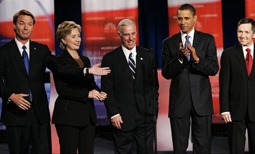
Howard Dean: I think there’s some of that, but by and large this tactic was used by the Republicans before Barack Obama was elected President. I’m sure there’s some degree of that, but I don’t think it’s a major [factor] by any stretch of the imagination.
PR.com: I agree. To me it’s so clearly an issue of greed, not an issue of race.
Howard Dean: To the old generation there is probably some of that, but for the younger people there is less of it.
PR.com: I interviewed Dr. Andrew Weil not too long ago, and he advocates the rationing of high tech medicine through a triage system. What are your thoughts on that idea?
Howard Dean: Totally unnecessary. We use so much high tech medicine right now that you could cut what we do by a third and no one would notice. What you’ve got to do is change the way we are paying doctors, which they’re about to do in Massachusetts. If you got rid of pay-for-service medicine you’d get rid of a lot of unnecessary high tech medicine without doing any rationing at all, or effecting people’s care. So I don’t agree that you need to ration high tech medicine.
PR.com: When exactly is this healthcare reform bill coming before Congress? When will it be voted on?
Howard Dean: We don’t really know that yet, but I suspect it will be voted on in the Senate in late October, and then in the House probably after that, and get to the President’s desk probably in December.
PR.com: In the sixties, when Lyndon Johnson put Medicare into effect, was there the same type of backlash?
Howard Dean: There actually was. They hired Ronald Reagan to tell people that the sun was setting on America and that someday, if Medicare passed, that we’d look around and we wouldn’t have America anymore. It’s ridiculous of course. Medicare has been an enormous success.
PR.com: How did Johnson manage to overcome that backlash to get Medicare passed through?
Howard Dean: The Republicans at that time were not like they are today. They had disagreements based on ideology, but they were actually willing to work with the President. Today the Republican Party is more interested in the future of the Republican Party than I think they are in the future of the country, and it shows in their behavior. It would be unthinkable in Johnson’s era to have the Republicans essentially boycott any serious discussion on healthcare reform. That just would never have happened when Johnson was President. The Republicans just weren’t like that in those days, and I think the Republicans will eventually come back around because the American people are going to reject that kind of behavior.
PR.com: What is the Republicans’ agenda in attempting to mislead the American public about healthcare reform?
Howard Dean: The Republicans are just interested in politics. They want to damage Obama, and that’s really their sole agenda.
PR.com: So you’re saying their sole objective is to gear up for 2012, even at the expense of the American people?
Howard Dean: Well 2010 and 2012. For a long time they’ve put their own agenda ahead of the agenda for the country. They’re true believers. They believe that they’re so right that they have the right to tell everybody else what to do, whether they like it or not. That’s why they’re in the position they’re in right now.
PR.com: They’re right about what? What’s the crux of their argument?
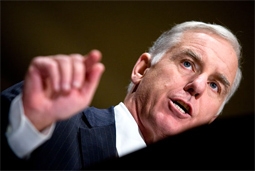
Howard Dean: About their view of the world. It’s sort of the Dick Cheney approach. It’s, “We’re right, so therefore anything is justified in getting what I want done.” That’s just not going to sell. It’s why they’re in the minority right now, and why they’re likely to stay there. They have one agenda. This is why the Republicans are so effective in an opposition force. The only agenda they have is to take back power. Everything else is secondary.
PR.com: Aside from the start-up entrepreneur, if President Obama’s healthcare reform should be passed into law, where does that leave the established small businessman? The business owner who has anywhere from 20 to 100 employees?
Howard Dean: As the bill currently stands, and I hope they’ll expand this, the Senate version says that if you have less than twenty-five employees, and the House version says if you have less than a half a million dollar payroll, you don’t have to be in the health insurance business anymore. You have no obligation to your employee. And that’s actually a good thing for the employees. Because they get a subsidy based on their income from the federal government. So they’ll pick whether they want a private or public plan. It’s wonderful for people who create most of the jobs in this country. We really need to help small business because they create 74% of all the new jobs in America, and that’s where it leaves them. I think it would be nice if it was fifty employees and a million dollar payroll, and I hope it will be by the time they pass the bill.
PR.com: Just to reiterate, if you have below a certain number of employees or under a certain dollar amount in your company’s payroll you will no longer be responsible for paying your employees’ health insurance, and they are to go out into the open market…
Howard Dean: Yeah, but with help from the government to supplant what you got from the employer.
(Did everybody get that? Good. Moving on.)
PR.com: You’re a physician yourself. Where is the collective voice of healthcare providers in all of this? Have they organized at all or testified before Congress?
Howard Dean: Oh yeah, a huge group of people who are in favor of health [reform] including the American Medical Association, which is shocking. The American Medical Association endorsed Henry Waxman’s bill which is a very progressive bill. And that’s the most conservative medical group that I know of. There are others of course. There’s Physicians for National Healthcare who are in favor of single payer. There are many, many people in the medical profession, both doctors and nurses, who are very vigorously supportive of healthcare reform.
PR.com: Is Capitalism failing, in your opinion?
Howard Dean: Capitalism is not regulated appropriately. I believe in Capitalism, but the fact is, Capitalism needs regulations just like everything else. Pure Capitalism leads to what went on, on Wall Street over the last eight years. We need to regulate Capitalism if we’re going to make it work right to protect it from itself.
PR.com: Anytime you step in to regulate Capitalism, does that then flip it into Socialism?
Howard Dean: Of course not. That’s what the Republicans would argue but that’s mostly an argument based on ignorance. The people who benefit most from regulation are actually the Capitalists, themselves. It prevents them from engaging in any risk taking excesses that have gone on for the last eight years on Wall Street. If you have consequences to that behavior, real consequences, then Capitalism works better. Here’s the deal with Capitalism, if everybody in the country doesn’t benefit from Capitalism, then it fails. And I don’t think it’s to anybody’s advantage to have Capitalism fail. It’s a very productive system, but it will fail if you don’t save Capitalism from the people who are Capitalists, because they will always want to squeeze out more. At some point they squeeze out so much that only they are the beneficiary, and if the rest of the country is not benefiting then it doesn’t work anymore. The argument is not whether we should or should not regulate it. The argument is how much we should regulate it.
PR.com: When did Capitalism go off course?
Howard Dean: Capitalism has gone off course for years. The most famous early time was the Tulip Bubble in The Netherlands in the 1600s. This is a chronic pattern with Capitalism. People forget and then greed takes over, and then people get so greedy that they forget that we’re all in this together, and it has to work for everybody. The Depression was another example of that. It’s not a coincidence that The Depression was preceded by the golden twenties where fortunes were made, but not by very many people.
PR.com: And when is it ok to have a Monopoly?
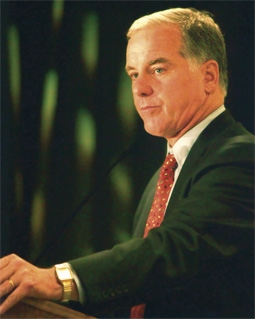
Howard Dean: Only when it’s very heavily regulated such as public utilities, where it makes sense to have a Monopoly, because why should you have multiple wire systems going all over the place? In fact, deregulation of public utilities was an enormous mistake because it led to higher rates. Vermont, for example, used to have the highest electric rates in New England, and we did not deregulate our utility business. Everybody else did. Today we have the lowest electric rates in New England, not because ours went down. It’s because everybody else’s went through the ceiling. So there are some times when Monopolies make sense, but only if they’re very heavily regulated.
PR.com: Will President Obama be successful in reforming healthcare?
Howard Dean: Yes. He will sign a bill in late December with a real public option that works.
PR.com: And when should that go into effect?
Howard Dean: That’s another battle. I very much believe that he needs to use Medicare as the public option, at least for some of the people. He should [include people] who are under sixty-five. You can’t do it for everybody because you wouldn’t want a hundred million people in the Medicare system overnight, and there would be a financial problem, but you certainly can do it for some people. I believe that some people who are under fifty ought to be allowed to sign up for Medicare and pay premiums into the system. The reason I believe that is for political reasons. You need to show that this bill works before the 2010 elections. The only possibility of that is in using an existing bureaucracy. There is no chance of being able to start up a new bureaucracy for a public option, so the only thing you could do is expand the Medicare system to cover more people.
Howard Dean’s book, “Howard Dean’s Prescription For REAL Healthcare Reform,” is now available through Chelsea Green Publishing, at Amazon.com and at bookstores.
To learn more visit democracyforamerica.com.
